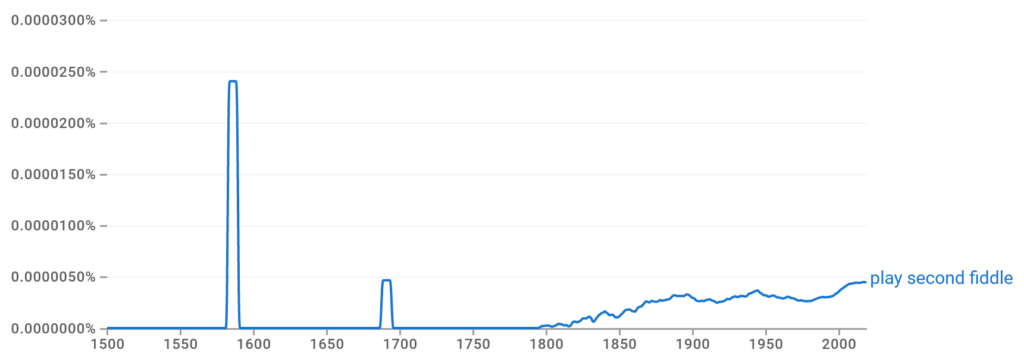To play second fiddle means taking a supporting or less prominent role in a given situation. This idiom, rich in its orchestral origins, is commonly used to describe situations where someone’s not in the lead or spotlight but still plays an important part.
Idioms, like play second fiddle, are age-old sayings with no literal meanings within the combination of words. They’re essential to the English language because they transform our words to convey thoughts, ideas, and emotions in a way anyone can understand.
In my quick article, I’ll explore the idiom’s meaning, variations, the various contexts in which it can be used effectively, its origin, and its related terms and phrases. Ready to learn about not always being center stage? Let’s jump right in!

What Does the Idiom Play Second Fiddle Mean?
The idiom play second fiddle means to take a subordinate or less important role in a situation, relationship, or endeavor.
Dictionary.com defines the phrase play second fiddle as “to play a supporting or minor role in relation to someone else.” Moreover, the Collins Dictionary states that “if you play second fiddle to someone, your position is less important than theirs in something that you are doing together.”
In other words, it’s a metaphorical expression used to describe a role or position that’s secondary or less important compared to someone else’s in a specific context or situation. It’s perfectly acceptable to use it in both personal and professional settings.
Literal Meaning vs. Figurative Meaning
The literal meaning of playing second fiddle refers to the role of the second violinist in an orchestra, who supports the lead or first violinist. Figuratively, it extends to any scenario where a person takes a backseat, supporting a more prominent figure.
Variations of the Idiom
- I’m tired of playing second fiddle to her all the time.
- In that team, he always seemed to play the second violin.
- I’m nothing but a second fiddle to you, aren’t I?
- Despite her talents, she often plays second fiddle in the orchestra.
- In the last project, he played second fiddle to the team leader.
- Accepting the second-fiddle position, she supported the main presenter during the event.
How Is Play Second Fiddle Commonly Used in Context?
The idiom play second fiddle finds its way into various contexts, reflecting a dynamic interplay of roles, influence, and relationships. Understanding its versatile usage enhances our ability to navigate different scenarios with nuance and clarity.
In the upcoming sections, we will explore the different ways this expressive phrase is employed, provide practical tips for its effective use, and discover real-life examples that illustrate its nuanced application.
What Are the Different Ways to Use Play Second Fiddle?
The following examples illustrate the varied ways in which playing second fiddle manifests across different aspects of life.
- In team dynamics: Despite her expertise, Octavia often plays second fiddle to the team leader, allowing others to take the lead.
- Career decision-making: Faced with two job offers, Jasper decided to play second fiddle and accepted the supporting role for the benefit of the team.
- Navigating personal relationships: In matters of the heart, Raven realized she was playing second fiddle, adjusting her expectations to maintain harmony.
- Acceptance of circumstances: During challenging projects, Bellamy adopts a play-second-fiddle approach, recognizing the strengths of his team members.
- Philosophical outlook on life: Embracing a play-second-fiddle mindset, Abby finds peace in accepting that not every situation requires her to be in the spotlight.
What Are Some Tips for Using Play Second Fiddle Effectively?
These tips offer guidance on utilizing play second fiddle effectively, emphasizing collaboration, adaptability, and personal growth.
- Choose collaboration wisely: Use the idiom strategically in collaborative settings to enhance teamwork.
- Balance assertiveness: Use play second fiddle judiciously; assertiveness is vital, but recognizing others’ strengths fosters teamwork.
- Acknowledge personal growth: Playing second fiddle doesn’t diminish your worth; see it as an opportunity for personal and professional growth.
- Embrace adaptability: Be adaptable; playing second fiddle might not always mean a subordinate role but rather adapting to diverse situations.
- Celebrate team success: Success isn’t solely individual; playing second fiddle contributes to collective achievements—celebrate them.
Where Can You Find Examples of Play Second Fiddle?
This idiom is often featured in literature and films, usually to describe characters who support the protagonist.
In Shakespeare’s “Othello,” several characters can be seen playing second fiddle to the more dominant personalities.
One of my favorite inspirational quotes is by Mason Cooley, who uses the idiom: “Those who refuse to play second fiddle may wind up playing no fiddle at all.”
The once-popular 1957 movie Second Fiddle sums up the idiom in its title, and the premise of the film evokes the whole idea of the phrase.
What Is the Origin of the Idiom Play Second Fiddle?

The phrase play second fiddle came from the world of orchestral music. Specifically, it refers to the role of the second violinist, who plays a supporting role to the first violinist.
It has a spike in popularity from the 1500s, but that was likely its literal use. The idiom took off sometime during the 1800s. One of the earliest uses of the phrase in idiom form is from 1801 in an English newspaper,
“Storace and Braham are gone to Bath, disgusted, it is said, to find that, after being engaged to oppose Mrs. Billington, they are now to play second fiddle to her and Incledon.”
It was all about how the two opera singers were upstaged by their rivals and were forced to essentially play second fiddle in the performance.
How Did the Idiom Evolve Over Time?
Over time, this musical term transcended its literal origins to become a common metaphor in everyday language for describing a supporting role.
What Are Some Related Terms to Play Second Fiddle?
Here are a few alternatives and opposite terms that work with this idiom to give you ways to add depth to your words.

Synonyms
- Take a backseat
- Cast aside
- Runner up
- Play a supporting role
- Be in someone’s shadow
- Ride shotgun
- Hold the reins
Antonyms
- Take the lead
- Be in the limelight
- Play first fiddle
Play Second Fiddle: Test Your Knowledge!
Choose the correct answer.
What Have We Learned About Play Second Fiddle?
Play second fiddle highlights the importance of roles that may not always be at the forefront but are crucial for the success of any endeavor. Whether in teamwork, relationships, or personal growth, remember the power it holds in fostering collaboration and acknowledging diverse contributions.
Now that we’ve covered its full meaning and explored its origin, you should be ready to use it like a pro, especially with the variations and synonyms I laid out for you. Ready to wield this expressive idiom with finesse? Dive into more idiomatic insights and language mastery in our other articles—it’s your journey to linguistic excellence!
